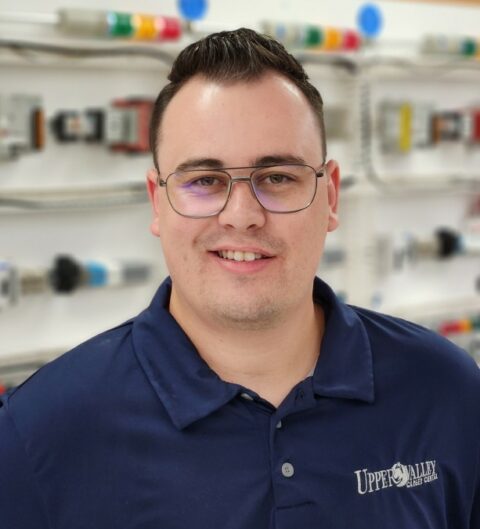“I love seeing someone find their spark in something they are interested in. Seeing someone with true passion for what they create inspires me to continue to push and challenge those people to make them better programmers, troubleshooters, and individuals. Having the opportunity to make a positive impact on someone’s life is what teaching is all about.”
Konner Keller teaches manufacturing and robotics at Upper Valley Career Center in Piqua, Ohio. Drawing on his prior career as a robotics programmer and systems integrator, Keller’s passion for solving complex challenges led him to pursue a career as a skilled trades teacher. He completed his associate’s degree in applied science, majoring in robotics and automation from the University of Northwestern Ohio, and is a FANUC National Occupational Competency Testing Institute certified instructor.
Keller’s project-based class prioritizes learning applied problem solving in order to provide students with industry experience that will make them competitive in the job market. The culmination of his program is a capstone project which students must design, program, and build, then present at an open house for industry professionals, program advisory members, friends, family and the community. These projects have included a robotic coffee barista, a Jenga block-stacking robot, and a robotic black-jack card dealer. Every experience in the classroom is an opportunity to learn, and Keller incorporates automation and programming across the classroom even for simple tasks like taking a restroom break. Keller’s students must master a number of electrical and manufacturing skills, such as electrical wiring, panel building and basic metal fabrication.
Keller’s students have the opportunity to showcase their skills in robotics and automation, mechatronics, and additive manufacturing competitions through their SkillsUSA chapter. In 2022, two of his students won first place in the Ohio SkillsUSA Robotics & Automation Competition and placed third in the national competition. These experiences, as well as Keller’s partnership with local industry, prime his students for success beyond high school. Keller takes advantage of his area’s many manufacturing businesses, production facilities, factories and system integrators by tapping industry leaders for his advisory committee and connecting students to opportunity after graduation.
Keller also attends annual conventions in order to keep-up-to-date with emerging technologies and current industry practices. Modern technologies implemented by Keller in his classroom include 3D printers and educational software that allows students to access their instructional materials from their cellphones.
This program has impacted the lives of Keller’s students in a variety of ways. Graduates of his program are entering fields like engineering, while others are continuing their skilled trades training in higher education. Students tell Keller that his class has improved their professionalism, social skills, and decision-making.
“As most industry professionals would say, on the job experience will always allow for a better learning opportunity than in a classroom. Career tech education brings those on the job experiences into the classroom for students to learn and hone industry skills while still in high school. The more career tech education facilities in the United States means more students will have a stronger chance at succeeding in a higher paying job directly after high school and could potentially eliminate most college debt, creating a better America.”
